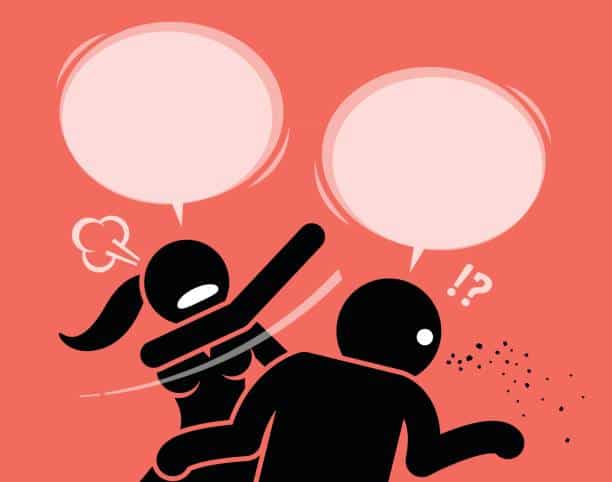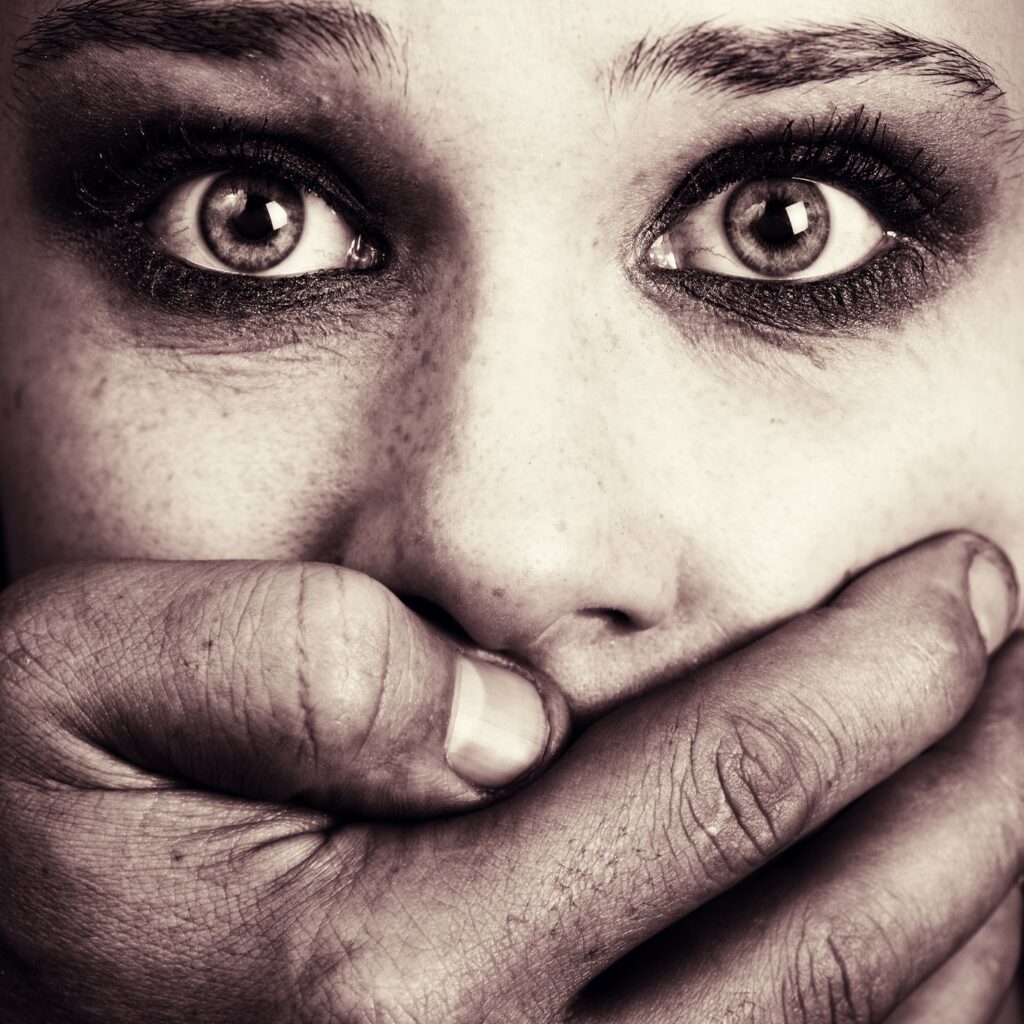Is it normal for my boyfriend to hit me? In any healthy and loving relationship, violence and abuse have no place. Unfortunately, some individuals find themselves in relationships where physical violence becomes a disturbing reality.
If you’re questioning whether it’s normal for your boyfriend to hit you, it’s crucial to understand that violence in relationships is not normal or acceptable under any circumstances.

This article aims to shed light on the topic of domestic violence, providing insight, support, and guidance for those who may be experiencing abusive behaviour from their partners. Remember, you deserve to be treated with love, respect, and kindness at all times.
Read Also: Domestic Violence: 5 Signs you are a victim and helpful resources
Is it Normal for my Boyfriend to hit Me?
No, it is not normal or acceptable for your boyfriend or any partner to hit you. Physical violence in a relationship is a clear sign of abuse and should never be tolerated. Healthy relationships are built on trust, respect, and open communication, not violence or intimidation.
If you are experiencing physical abuse, seeking help and support from trusted friends, family members, or professional organizations specializing in domestic violence is important. Remember, you deserve to be treated with love, kindness, and respect.
See: Domestic Abuse: Meaning, Causes, Prevention, and More
8 Reasons Why Your Boyfriend Hits You
Your boyfriend hits you for various reasons. While it may be helpful to understand these reasons and encourage him to seek therapy or make changes, it is crucial to recognize that physical abuse from a romantic partner is never acceptable.

The main reasons your boyfriend hits you are as follows:
1. He exhibits controlling behaviour. According to a 2011 study, women are more likely to experience physical abuse in a relationship if their partner displays controlling tendencies. A controlling man exerts dominance over you, taking charge of decision-making and disregarding, dismissing, and disrespecting your needs entirely.
Your boyfriend may initially employ subtle control tactics, but eventually, he will resort to hitting you – or even worse – particularly when you defy or challenge him.
2. If your boyfriend had an abusive childhood or a traumatic past, he may believe that hitting is normal due to the influence of what he witnessed in his own family dynamic. It’s a case of the popular saying, “monkey sees, monkey does.”
However, it’s important to note that your boyfriend’s history of trauma and abuse does not justify or make it acceptable for him to be physically violent towards you. While it may provide some insight into his current abusive behaviour, it should never be used as an excuse for his actions.
3. A man with insecurity and low self-esteem seeks to exert control, gain power, and validate his worth by devaluing you. When he engages in physical violence, he perceives it as a demonstration of his masculinity and a means of asserting control and power, compensating for his overall feelings of powerlessness and worthlessness.
In situations where you have accomplished something significant, such as obtaining a desired promotion, and he hasn’t achieved similar success in his own life, an insecure boyfriend is likely to feel triggered and resort to violence. Even a minor comment that challenges his fragile ego can be enough to provoke such behaviour.
4. If your boyfriend struggles with anger issues, he lacks a healthy means of self-regulating and managing his emotions. As a result, he resorts to hitting you as a way to express his anger.
5. Your boyfriend may hold the belief that you are responsible for his actions, thinking that you somehow provoked him or asked to be hit, similar to the notion that “women invite rape by dressing in revealing clothes.”
When he becomes frustrated, he resorts to the unhealthy expression of that frustration, which includes hitting you.
6. Various unresolved psychological issues, including personality disorders or untreated mental health conditions like depression or bipolar disorder, can contribute to a person’s engagement in abusive behaviour.
It is crucial to understand that while mental health problems can be a factor, they never justify or excuse violence. They should be considered as part of the larger context.
7. Engaging in substance abuse can often trigger violent behaviour. The consumption of alcohol, drugs, or other substances can impair judgment, intensify aggression, and result in a loss of control. Although this does not justify the behaviour, it is, unfortunately, a prevalent contributing factor.
8. Some men resort to physical violence in an attempt to assert control and prevent their partner from leaving due to their fear of abandonment or rejection. This misguided belief leads them to believe that violence will keep their partner ‘close’.
Read Also: 10+ Habits Of Toxic Friends
What to Do When Your Boyfriend Hits You: 11 Steps
Don’t underestimate the severity of your situation. Your boyfriend’s occasional acts of violence should not be downplayed, and comparing your experience to others who have it worse does not make it acceptable. It’s crucial to understand that you do not deserve to be hit, regardless of any perceived wrongdoing.
Remember, you deserve love and a healthy romantic relationship. Don’t fall into the trap of developing battered woman syndrome, convincing yourself that you should stay in an abusive relationship because there are moments of kindness and affection.
Take a stand against domestic violence and abuse. Create a plan for a safe exit strategy and leave the relationship. Leaving an unhealthy or toxic relationship is challenging, but you have the power to take action. Here is a step-by-step guide to help you navigate what to do when your boyfriend hits you or engages in any form of physical abuse.
See: 10 Red Flags In Relationships You Should Never Ignore

First Step: Know Your Situation
Recognizing and acknowledging that you are a victim of physical abuse is a crucial and courageous step towards reclaiming your power and seeking help. It is common for individuals in abusive relationships to minimize or deny the severity of the situation, but understanding the truth is essential for your well-being.
Second Step: contact the National Domestic Violence Hotline
Take immediate action by calling the National Domestic Violence Hotline at 800-799-7233 if your boyfriend hits you, regardless of whether it’s the first or hundredth time. Alternatively, you can text them at 88788 for assistance.
The hotline operates as a 24/7 support service that is free, confidential, and available in multiple languages. The advocates (or operators) are there to assist you in English, Spanish, and other languages. They can listen to your situation, aid in recognizing abuse, develop a customized safety plan and provide emergency options.
Third Step: Conduct a Secret Research
When you find yourself in an abusive relationship, like experiencing your boyfriend hitting you, conducting research discreetly is crucial. Take the initiative to visit the library and utilize their computers to search for local women’s shelters or reach out to trusted friends and family through messaging for assistance.
Fourth Step: Get your Stuff and Draw an Escape Plan
Simply leaving the relationship may not be a safe option for you, as there is a genuine concern that your boyfriend may pursue you and escalate the violence beyond hitting. Recognizing this valid fear, it becomes crucial to discreetly gather your essentials.
Prepare by secretly packing items such as a burner cell phone, cash, clothing, hygiene products, vital documents (like your social security card), and necessary medications. Consider storing these items in a hidden location like a bus locker or at a trusted friend’s place.
Be mindful not to overpack, as you don’t want to raise suspicion and potentially provoke further harm from your boyfriend.
You also need to Draw a safe exit Plan:
- Inform several trusted friends and/or family members about the abuse you’re experiencing and seek their assistance. Establish a code word or phrase that can be used discreetly to signal the need for someone to come and pick you up without arousing suspicion from your boyfriend.
- If you own a car, make sure it is always fueled and unlocked (if possible). Additionally, position your car as the last one in the driveway if you live together, allowing for a quick and easy escape.
- In the absence of a car, familiarize yourself with nearby bus and train schedules and commit them to memory.
- Keep a record of your boyfriend’s schedule to identify opportune moments to leave, such as when he is at work or on a business trip.
Fifth Step: Maintaining Records of the Abuse
Maintaining records of the abuse you endure is crucial to prevent your boyfriend from denying it. Create written documentation of incidents, including text messages or any other relevant forms of communication.
Additionally, consider making videos that capture instances of abuse. Safely store this evidence in a secure location. This documentation will serve as valuable evidence should you choose to pursue legal action, assisting you and your lawyer in building a strong case against your abuser.
Sixth Step: Call the Authorities
In situations where your safety is at immediate risk or your boyfriend’s physical violence poses a threat to your well-being, it may be necessary to contact the local authorities, such as the police.
Upon assessing the circumstances and finding probable cause, the police may proceed to arrest your boyfriend. It is crucial that you file charges against him in order to hold him accountable for his actions.
Seventh Step: Get Medical Help
If the violence inflicted by your boyfriend escalates to a severe level and you sustain injuries requiring medical attention, it is important to seek help immediately. Visit the nearest emergency room or schedule an appointment with your healthcare professional to have your injuries treated.
When discussing your situation with the medical staff, be honest about the abuse you have experienced. The doctor can offer guidance on the appropriate steps to take, assist you in creating a safety plan, and document the details of the abuse for future reference.
Suppose you need to contact the National Domestic Violence Hotline, the police, or a trusted friend or family member. In that case, the doctor may provide you with privacy in the examination room to make the necessary calls.
Eighth Step: Seek Therapy
Experiencing abuse, even if it’s just a single incident of being hit, can profoundly impact your mental well-being. You may likely require counselling or therapy to support you in coping with the traumatic event.
Seeking professional help can provide you with a safe space to process your emotions, address any psychological effects of the abuse, and develop healthy coping mechanisms. A trained therapist or counsellor can offer guidance, support, and tools to assist you in your healing journey.
Remember, prioritizing your mental health is crucial in recovering from the trauma you have endured.
Ninth Step: Establish a Good Support Network
Maintaining a strong support network is crucial, especially when you are facing abuse from your boyfriend. Your trusted inner circle plays a pivotal role in providing emotional support, guidance, and assistance throughout the abusive situation and beyond.
These individuals can be your allies in developing a safe exit plan and taking steps towards ending the abusive relationship. They can offer you a listening ear, practical help, and provide stability and encouragement during challenging times.
Additionally, your support network can help you stay focused on your well-being and prevent you from returning to your abuser.
Tenth Step: Take Legal Action
Abuse from a boyfriend or any romantic partner is a violation of the law, and you have the right to take legal action against your abuser. You can pursue several avenues to seek justice and protect yourself from further harm.
- Restraining Order: You can apply for a restraining order, also known as a protection order or an order of protection, which legally prohibits your abuser from contacting or approaching you. This provides a legal barrier and can help ensure your safety.
- Criminal Charges: If you wish to hold your abuser accountable for their actions, you can report the abuse to the police and press criminal charges. Law enforcement agencies can investigate the situation, gather evidence, and pursue legal consequences for the abuser.
- Civil Lawsuit: In some cases, you may choose to sue your abuser civilly, seeking compensation for the physical, emotional, and financial damages you have suffered as a result of the abuse. Consult a lawyer specialising in domestic violence cases to understand your legal options.
Eleventh Step: Be Confident with Yourself
Indeed, trusting yourself is crucial as you navigate the journey towards safety and healing. You possess inner strength and resilience that can guide you towards a better future. Here are some important points to remember.
See: 21 Questions For A New Relationship
Why do I Continually Accept Abuse from my boyfriend?
If you’re questioning whether it’s normal for your boyfriend to hit you, it’s important to recognize that physical abuse is never acceptable or justified in any relationship. It’s essential to prioritize your safety and well-being above all else.
However, it can be helpful to understand some factors that may contribute to why some individuals engage in such behaviour. Here are a few possible reasons:

- Love and Hope: Your deep affection for your partner and the hope that they will change might have led you to tolerate their abusive behaviour. Believing in the inherent goodness of people is admirable, but it’s important to recognize that genuine change can only come from within them.
- Fear: Fear can be a powerful force that influences our actions. The fear of retaliation, being alone, or fearing the unknown may have contributed to your acceptance of the unacceptable behaviour. It’s essential to prioritize your safety and well-being above all else.
- Low Self-Esteem: If you have been consistently demeaned or made to feel unworthy, it’s possible that your self-esteem has been eroded, leading you to believe that you deserve the abuse. It’s crucial to understand that you are deserving of respect, kindness, and love. The abusive actions of another should never determine your self-worth.
- Normalization of Violence: Growing up in an environment where domestic violence was prevalent may have desensitized you to its gravity, causing you to unknowingly accept it as a normal part of relationships. It’s important to recognize that domestic violence is never normal or acceptable.
Remember, acknowledging these factors does not minimize the harm caused by abuse. It serves as a starting point for understanding and breaking free from the cycle of abuse. You deserve a relationship built on respect, safety, and genuine love.
See Also: Reactive Abuse: Examples, Signs, Effects, Solutions
Conclusion
If you find yourself questioning whether it is normal for your partner to hit you, it is important to recognize that any form of abuse is never acceptable or justified. You are not to blame for your partner’s abusive behaviour, and it is crucial to absolve yourself of any guilt or responsibility.
Understanding the reasons why you may have found yourself in this situation can help shed light on the complex dynamics at play, but it does not excuse or justify the abuse.
Your safety, well-being, and happiness should always be the top priority. Trust your instincts, seek support from trusted individuals or organizations, and remember that you deserve to be treated with respect, kindness, and love.
